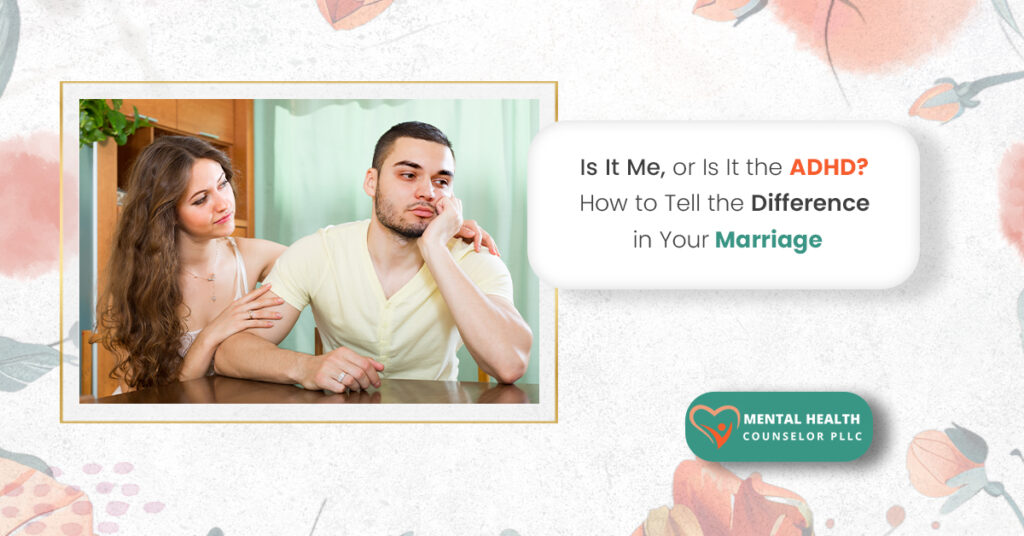
The same conflict surfaces again.
Tasks abandoned halfway through, commitments vanishing from memory, another conversation where your partner’s focus drifts despite their visible effort to stay present.
You’re left questioning the distinction, is this relational avoidance, or are you witnessing executive dysfunction in real time?
When ADHD Manifests in Intimate Relationships
ADHD doesn’t confine itself to occupational or academic settings. It permeates domestic life, shaping interaction patterns and communication dynamics.
The challenge lies in differentiating between neurological symptoms and typical relationship friction.
Your partner might consistently miss significant dates, not through emotional neglect, but because their working memory and temporal processing genuinely misfire.
Perhaps you’re the one managing ADHD, experiencing chronic criticism for behavioral patterns that resist modification despite considerable effort.
Either scenario creates emotional exhaustion and relational strain for both partners.
Behavioral Markers That Suggest ADHD
Certain patterns emerge consistently in relationships affected by ADHD. While not universal, these indicators warrant attention:
- Initiating projects with intense hyperfocus, then experiencing rapid interest decay
- Demonstrating sustained inattention during conversations despite genuine engagement attempts
- Exhibiting chronic forgetfulness around commitments, schedules, or verbal agreements
- Experiencing decision paralysis with routine household choices
- Displaying impulsive financial behavior or spontaneous plan alterations
- Showing emotional dysregulation disproportionate to situational triggers
Everyone experiences these behaviors occasionally. The ADHD distinction involves frequency, intensity, and resistance to behavioral modification despite authentic motivation.
Distinguishing Standard Relationship Dynamics
Not every source of marital tension stems from ADHD. Sometimes partners demonstrate genuine inconsideration.
Sometimes external stressors compromise functioning. Sometimes you’re simply two individuals with incompatible communication styles or attachment patterns.
Typical relationship issues generally respond to direct communication and collaborative problem-solving.
ADHD symptoms persist despite repeated discussions and genuine intentions to change.
The deficit in the executive functions forms a distance between intent and action which could not be resolved with willpower alone.
That disconnect, the agonizing space between wanting to change and neurologically struggling to implement that change, defines much of the ADHD experience.
Related: 7 Signs Your Marriage Struggles Might Be Rooted in ADHD
The Bidirectional Impact on Partners
The non-ADHD partner frequently assumes a managerial role rather than maintaining an egalitarian partnership.
You’re compensating for gaps, providing external structure, absorbing household cognitive load. Resentment accumulates gradually, and burnout becomes inevitable.
The ADHD partner experiences chronic shame cycles and diminished self-efficacy.
Repeated relational failures despite genuine effort erode self-worth and create defensive withdrawal.
Eventually, learned helplessness may develop, why continue attempting what consistently results in disappointment?
Neither partner deserves blame. You’re navigating neurological differences that transcend effort or commitment.
Accessing Specialized Therapeutic Support
Working with clinicians who understand ADHD’s relational manifestations fundamentally shifts outcomes.
Mental Health Counselor PLLC offers specialized expertise in addressing these complex dynamics.
Michael Arnold, LMHC and practice founder, provides over twenty years of clinical experience supporting individuals through complicated psychological terrain.
His therapeutic team, Sandra Elder (MHC-LP), Lori-Ann Brown, Karla Suarez (LMHC, LCPC, NCC), Mia Davy (MHC-LP), and Lexie Montalvo (MHC-LP), brings diverse specializations to couples navigating ADHD challenges.
The practice offers both traditional in-person sessions and telehealth options via secure video platforms, addressing the access barriers that executive dysfunction often creates.
What Evidence-Based Couples Work Provides
Couples therapy for ADHD-affected relationships doesn’t pathologize the ADHD partner.
Instead, it establishes psychoeducation around neurodevelopmental differences while building compensatory strategies customized to your relational system.
Clinical work focuses on:
- Differentiating ADHD symptoms from volitional behavior
- Implementing external scaffolding and environmental modifications
- Developing communication protocols that accommodate processing differences
- Regulating emotional reactivity through co-regulation techniques
- Restructuring responsibility distribution to prevent caregiver dynamics
The therapeutic goal centers on sustainable partnership rather than symptom elimination.
Initiating the Therapeutic Process
If this content resonates, your clinical intuition is signaling the need for intervention. Your relationship doesn’t require perpetual cycling through maladaptive patterns.
Mental Health Counselor PLLC simplifies intake procedures.
Contact the practice, schedule your initial session, and engage, whether that means visiting our office or joining via telehealth from your home environment.
Individual sessions are $275 for 45 minutes, with insurance reimbursement often available.
Waiting for spontaneous improvement means denying the neurobiological reality at play.
With appropriate clinical support, you can construct a relational framework that honors both partners’ needs.
Your marriage deserves more than chronic miscommunication and accumulated hurt. Reach out today.
FAQs
Should both partners participate in therapy?
Yes, regardless of which partner carries the ADHD diagnosis. Treatment addresses the relational system, not just individual symptomatology, requiring both parties’ engagement.
What if my partner resists acknowledging ADHD’s role?
Individual therapy often proves effective initially. Observing one partner’s therapeutic progress frequently reduces the other’s resistance to participation.
How long does couple therapy last?
The duration of the treatment process is determined by the existing problems and treatment goals, yet most couples state that indicative changes in relationships are seen within several months of regular therapeutic interactions.
